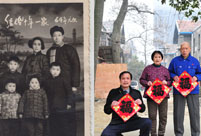 Deng Xiaoping: 'I have a clear conscience all my life'
Deng Xiaoping: 'I have a clear conscience all my life'
 Xi Jinping: 'The people are our strength'
Xi Jinping: 'The people are our strength'
 Amazing cliff diving in cold winter
Amazing cliff diving in cold winter
 Enjoy Sochi 2014 in slow motion
Enjoy Sochi 2014 in slow motion
 University student sentenced to death for poisoning roommate
University student sentenced to death for poisoning roommate
 Chinese lunar New Year celebrated in San Francisco
Chinese lunar New Year celebrated in San Francisco
 Taiwan Lantern Festival 2014
Taiwan Lantern Festival 2014
 Haiyang Yangge: make up
Haiyang Yangge: make up
 China's top 10 richest cities
China's top 10 richest cities
BEIJING, Feb. 25 -- A very special picture hangs on the wall of Xiaofei's new home in Shenzhen, southeast China's Guangdong Province. The newly-married engineer has framed a screenshot of the dialog he had with Aibi - now his wife - in a browser game five years ago.
The game brought Xiaofei, who was then studying in Leipzig, Germany, together with Aibi, who was then working in China. The two fell in love and Xiaofei later returned to China to be with her.
While Xiaofei and Aibi believe their marriage was made in heaven, Xia Tianyu hears such stories everyday in Huatian Community, an online dating company affiliated with Chinese Internet giant Netease. Xia, Huatian's general manager, and his 30-strong team are trying to decrypt the puzzle of love with the help of big data.
"This is a typical case of behavioral analysis leading to specific demand," he says. In Xiaofei's case, the game provided a dialog channel for people with similar traits, such as hobbies, personalities and ways of expression. If man and woman with matching indices happen to be single and looking for a partner, their online conversation will result in "specific demand" - a meeting, perhaps a date and whatever comes next....
Xia, an Oracle and database management expert, believes that all things seemingly unpredictable and subjective, such as love, can be measured by big data. This includes "hard indices" like age, height, weight, income and educational background, as well as "soft indices" like language, personality, social preferences, reading preferences, time spent online and even zodiac signs.
Liu Cixin, one of China's most celebrated sci-fi writers, also believes big data can help people find their other half. "I once read an article saying that every person on Earth can, in theory, fall in love with 600,000 others. It sounds amazing, but how many of the 600,000 will the person actually meet? Very few, I think.
"Big data can pick out potential dating pairs from a very large pool, which is more accurate than traditional match-making, and give them chance to meet and communicate," Liu says.
United States mathematician Christopher McKinlay reportedly used big data in his own - arguably not very romantic - quest for love.
AFP reported that McKinlay opened several accounts on the dating site OKCupid, and pulled out 6 million questionnaire answers from 20,000 registered women. He wrote programs to pick out 5,000 active users and narrowed the pool down by indices suitable for marriage.
Within 90 days, his optimized algorithm had found a match: an Asian woman who later became his fiancee.
The concept of big data is new in China, where most online users were born after 1980, a generation now in their marrying years.
Unlike their parents who mainly relied on match-making by relatives, friends and colleagues, today's young people - big city dwellers, always on the go, with no time for romance - are turning to Internet for help.
Qu Xin, a university lecturer in east China's Anhui Province, opened her first account on QQ, a leading Chinese short message service, in 2000 when she was only 15.
"I began to hear about love affairs on the Internet, but media reports were then critical, so our parents forbade us to use QQ. But we still chatted online secretly," Qu recalls.
The 28-year-old has received many advances through QQ. She also has accounts in other Chinese social media, such as Twitter-like Weibo and Wechat, a popular mobile messaging application. But none has helped her find her Mr. Right.
"I often chat with guys online, but most of them are already my friends in real life. If it doesn't work out in real life, it won't work out on the Internet," she says.
Qu has registered with several online dating companies and hopes the professionals can identify a boyfriend.
According to the Department of Civil Affairs, China's single marriage-age population stood at 180 million in 2013. But despite the huge number, finding the soul mate has never been easy for young Chinese.
"Love is still beyond the understanding of science," says Ji Xiaohua, CEO and founder of popular science website Guokr.com.
But, he adds, big data can improve the odds in favor of a successful communication. "For example, well educated young people could find their love in big cities easier than in small ones, as big cities have more people of similar backgrounds. Big data can help filter out people with similar hobbies and interests on a larger scale, providing better matches than blind dates," Ji explains.
But big data has its limitations. "Biologists still can't analyze or understand love. When people fall in love, they make a decision both consciously and subconsciously. Big data can only cover the conscious factors, while the subconscious is still a mystery."
That doesn't deter Xia Tianyu and his engineers. The team organized a speed-matching event on Valentine's Day, and 100 singles were selected from 1,000 applicants and matched by computer during the event.
But before the computer could finish matching the 50 pairs, chemistry took over and the waiting lovebirds challenged their big data choice by finding their own preferred mates.
"Machines and technology can't replace actual communication," Xia says. "But I hope one day, it will solve all human mysteries, including love."
 Chinese Dream: the Chinese Spirit and the Chinese Way
Chinese Dream: the Chinese Spirit and the Chinese Way 51 bronze sacrificial utensils unearthed in Shaanxi
51 bronze sacrificial utensils unearthed in Shaanxi Most gorgeous female celebs in Chi-pao
Most gorgeous female celebs in Chi-pao Second round of test kicks off at Beijing Film Academy
Second round of test kicks off at Beijing Film Academy Ancient Qiang people had vertically grown teeth
Ancient Qiang people had vertically grown teeth Top 10 Chinese youth’s favorite seaside destinations
Top 10 Chinese youth’s favorite seaside destinations Traditional Tibetan clothing tailors
Traditional Tibetan clothing tailors In photos: Unveiling Taishan station
In photos: Unveiling Taishan station Beautiful moments of family reunion
Beautiful moments of family reunion Chinese warplanes C919 to appear at Singapore Airshow
Chinese warplanes C919 to appear at Singapore Airshow Ruins of Shang Dynasty's structure unearthed in Shaanxi
Ruins of Shang Dynasty's structure unearthed in Shaanxi  Intercity high speed train in operation
Intercity high speed train in operation Severe coldness freezes large parts of China
Severe coldness freezes large parts of China  Beautiful moments of Sochi
Beautiful moments of Sochi  It's not just performing this year
It's not just performing this yearDay|Week|Month